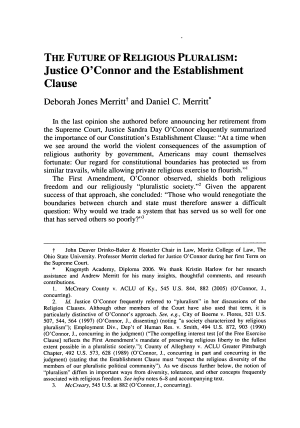The Future of Religious Pluralism: Justice O'Connor and the Establishment Clause
January 2007

Other pages in the O'Connor Institute Online Archive mentioned in this article:
| NAME / TITLE | TYPE |
|---|---|
| Deborah A. Jones (Merritt) | Law Clerk |
DISCLAIMER: This text has been transcribed automatically and may contain substantial inaccuracies due to the limitations of automatic transcription technology. This transcript is intended only to make the content of this document more easily discoverable and searchable. If you would like to quote the exact text of this document in any piece of work or research, please view the original using the link above and gather your quote directly from the source. The Sandra Day O'Connor Institute does not warrant, represent, or guarantee in any way that the text below is accurate.
Article Text
(Excerpt, Automatically generated)
THE FUTURE OF RELIGIOUS PLURALISM:
Justice O'Connor and the Establishment Clause
Deborah Jones Merritt* and Daniel C. Merritt**
In the last opinion she authored before announcing her retirement from the Supreme Court, Justice Sandra Day O'Connor eloquently summarized the importance of our Constitution's Establishment Clause: "At a time when we see around the world the violent consequences of the assumption of religious authority by government, Americans may count themselves fortunate: Our regard for constitutional boundaries has protected us from similar travails, while allowing private religious exercise to flourish." 1
The First Amendment, O'Connor observed, shields both religious freedom and our religiously "pluralistic society." 2 Given the apparent success of that approach, she concluded: "Those who would renegotiate the boundaries between church and state must therefore answer a difficult question: Why would we trade a system that has served us so well for one that has served others so poorly?"3
* John Deaver Drinko-Baker & Hostetler Chair in Law, Moritz College of Law, The Ohio State University. Professor Merritt clerked for Justice O'Connor during her first Term on the Supreme Court.
* * Kragmyth Academy, Diploma 2006. We thank Kristin Harlow for her research assistance and Andrew Merritt for his many insights, thoughtful comments, and research contributions.
McCreary County v. ACLU of Ky., 545 U.S. 844, 882 (2005) (O'Connor, J., concurring).
Id. Justice O'Connor
